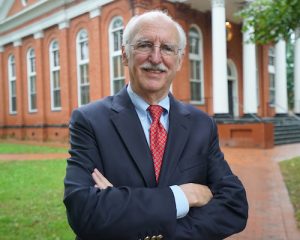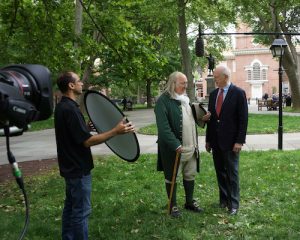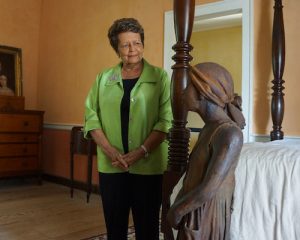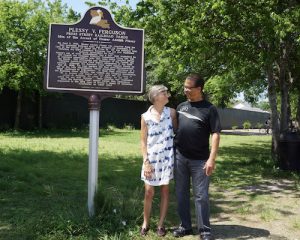Communiqué
Three-Part Documentary Miniseries “A More or Less Perfect Union” Explores the U.S. Constitution, Starting Thursday, February 6
< < Back toThree-Part Documentary Miniseries A More or Less Perfect Union, A Personal Exploration by Judge Douglas Ginsburg Explores the U.S. Constitution
Premieres on WOUB Beginning February 6, 2020

A More or Less Perfect Union, A Personal Exploration by Judge Douglas Ginsburg, a new three-part documentary series, explores the U.S. Constitution – the document that governs those who govern us – delving into past, present, and future struggles for liberty.
Hosted by Judge Douglas H. Ginsburg, a constitutional expert with 30 years of experience on the Federal Court of Appeals in Washington, DC, A More or Less Perfect Union features perspectives and interviews from constitutional experts of all stripes – liberal, conservative and libertarian – examining the key issues of liberty: freedom of religion and press, slavery and civil rights, the Second Amendment, separation of powers and more. To add context to the shaping of American governance, the series offers firsthand perspectives, including those of a diverse range of American citizens, direct descendants of those involved in pivotal civil rights cases, historians, Constitutional experts, business owners, and judges.

“More than any other program Free to Choose Media has produced, A More or Less Perfect Union is relevant to audiences of every social, political, and economic background,” said Free to Choose President/CEO Robert Chatfield. “The Constitution is ours as a nation and we all have an interest in protecting it.”
Episode one, “A Constitution in Writing,” examines the struggles and compromises in the creation of the document that defines the United States of America. From the battlefield at Old Sturbridge Village, Massachusetts, to Independence Hall, Boston Harbor, and the House of Burgesses in Virginia, Judge Ginsburg ponders: Were the powerful words used by the Framers meant to be updated by courts as our nation evolves, or only by following the amendment process specified in the Constitution itself? Constitutional experts, citizens and–in dramatic recreations, the Framers themselves–weigh in on the unique document, the rule of law, the three branches of government separated to prevent tyranny, and the debate over originalism versus a living Constitution.

Episode two, “A Constitution for All,” explores Constitutional amendments, including the Bill of Rights and amendments related to equal protection, slavery, and voting rights through significant Supreme Court decisions including Dred Scott v. Sandford and several cases affecting LGBTQ rights, with interviews at locations ranging from the Whitney Plantation in Louisiana to the Newseum in Washington, DC. Constitutional experts address hot-button historical and timely issues, including limits on rights of free speech, free press, bearing arms, and individual protections such as due process during arrest and trial, unenumerated rights, and unalienable rights.

For more than two centuries, Americans have fought to establish liberty, expand liberty and preserve liberty. A More or Less Perfect Union concludes with episode three, “Our Constitution at Risk,” which shows how the Constitution is under pressure today and how, through action or inaction, all three branches of government are contributing to the problem. Judge Ginsburg asks: Are we ceding our rights so gradually that we don’t even know it is happening? Topics explored include affirmative action, racial profiling, the commerce clause, eminent domain, executive orders, treaties and executive agreements, illuminated through interviews with the descendants of Plessy v. Ferguson, with constitutional experts, local business owners, and others. Judge Ginsburg concludes, “The great safeguard of liberty is a government of laws and not of men. Our Constitution creates that government, but it works only if ‘we the people’ know the Constitution and protect it.”

